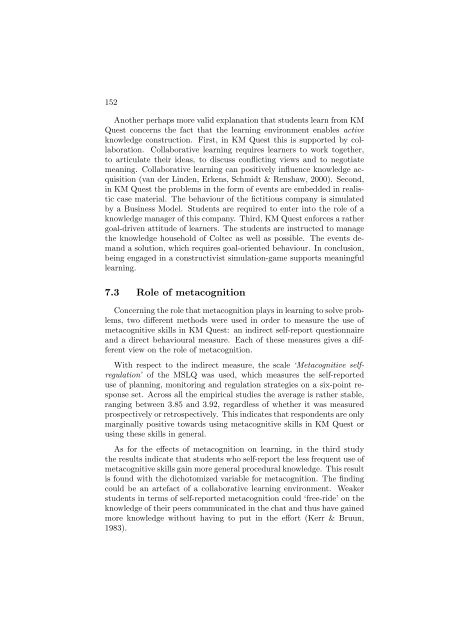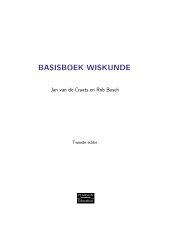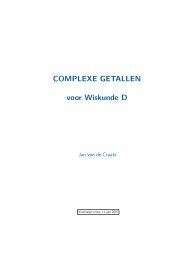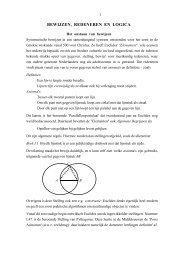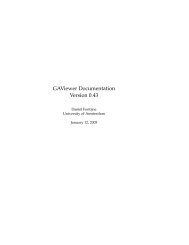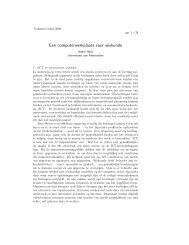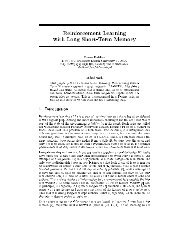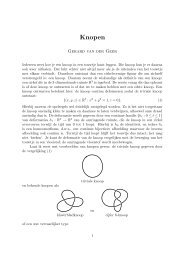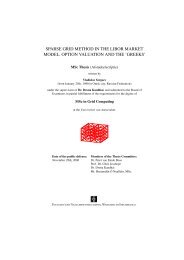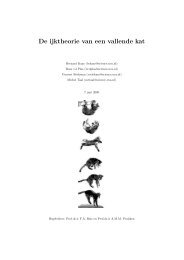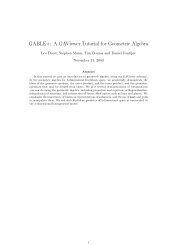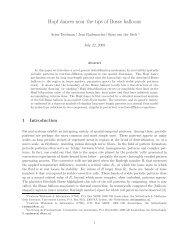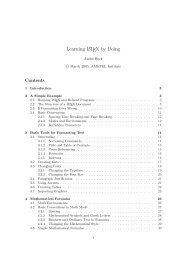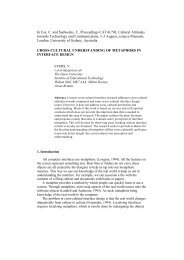The role of metacognitive skills in learning to solve problems
The role of metacognitive skills in learning to solve problems
The role of metacognitive skills in learning to solve problems
Create successful ePaper yourself
Turn your PDF publications into a flip-book with our unique Google optimized e-Paper software.
152<br />
Another perhaps more valid explanation that students learn from KM<br />
Quest concerns the fact that the learn<strong>in</strong>g environment enables active<br />
knowledge construction. First, <strong>in</strong> KM Quest this is supported by collaboration.<br />
Collaborative learn<strong>in</strong>g requires learners <strong>to</strong> work <strong>to</strong>gether,<br />
<strong>to</strong> articulate their ideas, <strong>to</strong> discuss conflict<strong>in</strong>g views and <strong>to</strong> negotiate<br />
mean<strong>in</strong>g. Collaborative learn<strong>in</strong>g can positively <strong>in</strong>fluence knowledge acquisition<br />
(van der L<strong>in</strong>den, Erkens, Schmidt & Renshaw, 2000). Second,<br />
<strong>in</strong> KM Quest the <strong>problems</strong> <strong>in</strong> the form <strong>of</strong> events are embedded <strong>in</strong> realistic<br />
case material. <strong>The</strong> behaviour <strong>of</strong> the fictitious company is simulated<br />
by a Bus<strong>in</strong>ess Model. Students are required <strong>to</strong> enter <strong>in</strong><strong>to</strong> the <strong>role</strong> <strong>of</strong> a<br />
knowledge manager <strong>of</strong> this company. Third, KM Quest enforces a rather<br />
goal-driven attitude <strong>of</strong> learners. <strong>The</strong> students are <strong>in</strong>structed <strong>to</strong> manage<br />
the knowledge household <strong>of</strong> Coltec as well as possible. <strong>The</strong> events demand<br />
a solution, which requires goal-oriented behaviour. In conclusion,<br />
be<strong>in</strong>g engaged <strong>in</strong> a constructivist simulation-game supports mean<strong>in</strong>gful<br />
learn<strong>in</strong>g.<br />
7.3 Role <strong>of</strong> metacognition<br />
Concern<strong>in</strong>g the <strong>role</strong> that metacognition plays <strong>in</strong> learn<strong>in</strong>g <strong>to</strong> <strong>solve</strong> <strong>problems</strong>,<br />
two different methods were used <strong>in</strong> order <strong>to</strong> measure the use <strong>of</strong><br />
<strong>metacognitive</strong> <strong>skills</strong> <strong>in</strong> KM Quest: an <strong>in</strong>direct self-report questionnaire<br />
and a direct behavioural measure. Each <strong>of</strong> these measures gives a different<br />
view on the <strong>role</strong> <strong>of</strong> metacognition.<br />
With respect <strong>to</strong> the <strong>in</strong>direct measure, the scale ‘Metacognitive selfregulation’<br />
<strong>of</strong> the MSLQ was used, which measures the self-reported<br />
use <strong>of</strong> plann<strong>in</strong>g, moni<strong>to</strong>r<strong>in</strong>g and regulation strategies on a six-po<strong>in</strong>t response<br />
set. Across all the empirical studies the average is rather stable,<br />
rang<strong>in</strong>g between 3.85 and 3.92, regardless <strong>of</strong> whether it was measured<br />
prospectively or retrospectively. This <strong>in</strong>dicates that respondents are only<br />
marg<strong>in</strong>ally positive <strong>to</strong>wards us<strong>in</strong>g <strong>metacognitive</strong> <strong>skills</strong> <strong>in</strong> KM Quest or<br />
us<strong>in</strong>g these <strong>skills</strong> <strong>in</strong> general.<br />
As for the effects <strong>of</strong> metacognition on learn<strong>in</strong>g, <strong>in</strong> the third study<br />
the results <strong>in</strong>dicate that students who self-report the less frequent use <strong>of</strong><br />
<strong>metacognitive</strong> <strong>skills</strong> ga<strong>in</strong> more general procedural knowledge. This result<br />
is found with the dicho<strong>to</strong>mized variable for metacognition. <strong>The</strong> f<strong>in</strong>d<strong>in</strong>g<br />
could be an artefact <strong>of</strong> a collaborative learn<strong>in</strong>g environment. Weaker<br />
students <strong>in</strong> terms <strong>of</strong> self-reported metacognition could ‘free-ride’ on the<br />
knowledge <strong>of</strong> their peers communicated <strong>in</strong> the chat and thus have ga<strong>in</strong>ed<br />
more knowledge without hav<strong>in</strong>g <strong>to</strong> put <strong>in</strong> the effort (Kerr & Bruun,<br />
1983).


